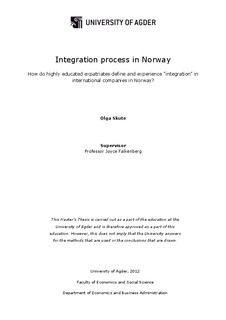| dc.description.abstract | Key words: Expatriate, expatriate integration, definition of integration, experience, expatriates in Norway, Norwegian culture, cultural difference, cultural distance, language.
Background: In the globalization era, the role of people who go overseas has become increasingly important. Norway is one of the attractive places to work – the economy remains strong in spite of the financial crisis and high unemployment in other countries. Statistics Norway indicates that 50.000 non-Nordic citizens moved to Norway in 2010 and the same number in previous five years.
Problem: It is necessary for expatriates to be satisfied in a professional life and in a private while staying in a host country. It is quite hard to leave one’s familiar surroundings and settle down in a new, unknown environment with different norms and rules. Integration into a foreign culture is seen as an important factor and is based not only on knowledge of the language, customs, norms and values, but on a personal interest in understanding its values and attitudes, emotional close contact with its representatives.
Purpose: The main purpose of the thesis is to define the term “integration”, and explore what integration means for expatriates, how they experience it and how to achieve it. In order to answer this question, it is important to understand how expatriates explain integration, and investigate whether and how they want to become part of the local society and how they experience the process of integration in international companies operating in Norway.
Research Methodology: This is an exploratory study, qualitative in nature, conducted in non-contrived setting with minimal researcher’s interference, with the main data collected from eight face-to-face interviews. The respondents were grouped into two distinct groups – (1) organizational expatriates and (2) self-initiated expatriates. The interviews focused around integration and expatriates experience.
Findings: A framework derived from literature review suggested main influencing factors, thus areas to be researched, which consist of: (1) motif of relocating, (2) culture differences and distance, (3) socio-cultural adjustment, (4) language, (5) preparation, (6) work environment, (7) social network and (8) acculturation process.
Conclusion: It was found that expatriates experience integration rather easily, as Norway is seen as formidable as easy to adapt to. The meaning of integration however was found to have much deeper meaning. Exploration of all aspects of integration, based on interviews and theoretical research, allowed the author to compile a comprehensive definition of what expatriate integration is, thus reaching the purpose of the thesis. | no_NO |
